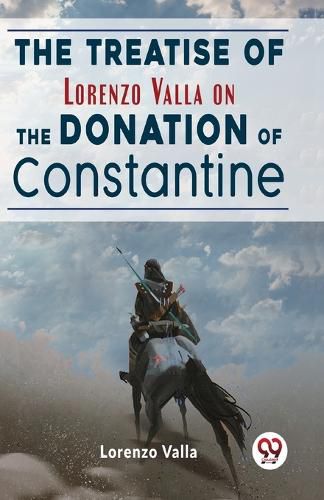Readings Newsletter
Become a Readings Member to make your shopping experience even easier.
Sign in or sign up for free!
You’re not far away from qualifying for FREE standard shipping within Australia
You’ve qualified for FREE standard shipping within Australia
The cart is loading…






This title is printed to order. This book may have been self-published. If so, we cannot guarantee the quality of the content. In the main most books will have gone through the editing process however some may not. We therefore suggest that you be aware of this before ordering this book. If in doubt check either the author or publisher’s details as we are unable to accept any returns unless they are faulty. Please contact us if you have any questions.
The book "The Treatise of Lorenzo Valla on the Donation of Constantine" was written in 1440 by the Italian humanist Lorenzo Valla, who lived in the 15th century. This study examines the "Donation of Constantine," a text reportedly written in the fourth century by the Roman Emperor Constantine. The constitution gave the pope control over the Western Roman Empire as well as temporal power. Valla's treatise reveals the document's falsification and establishes that it was a fake rather than an authentic text from the fourth century. One of the first occasions in history that critical textual analysis was used to establish a document was a fake was when he utilized historical and philological data to refute the document. Valla's insight was important and had a lot of sway. His work opened the groundwork for contemporary historical and textual criticism and advanced humanist research. The book was crucial in challenging the papacy's power during the Renaissance and in revealing the forgery that was the "Donation of Constantine." In conclusion, "The treatise of Lorenzo Valla on the Donation of Constantine" is a significant contribution to textual criticism and humanist research. It challenged the papacy's authority during the Renaissance by showcasing the effectiveness of critical textual analysis and revealing the forgery of an important historical document.
$9.00 standard shipping within Australia
FREE standard shipping within Australia for orders over $100.00
Express & International shipping calculated at checkout
This title is printed to order. This book may have been self-published. If so, we cannot guarantee the quality of the content. In the main most books will have gone through the editing process however some may not. We therefore suggest that you be aware of this before ordering this book. If in doubt check either the author or publisher’s details as we are unable to accept any returns unless they are faulty. Please contact us if you have any questions.
The book "The Treatise of Lorenzo Valla on the Donation of Constantine" was written in 1440 by the Italian humanist Lorenzo Valla, who lived in the 15th century. This study examines the "Donation of Constantine," a text reportedly written in the fourth century by the Roman Emperor Constantine. The constitution gave the pope control over the Western Roman Empire as well as temporal power. Valla's treatise reveals the document's falsification and establishes that it was a fake rather than an authentic text from the fourth century. One of the first occasions in history that critical textual analysis was used to establish a document was a fake was when he utilized historical and philological data to refute the document. Valla's insight was important and had a lot of sway. His work opened the groundwork for contemporary historical and textual criticism and advanced humanist research. The book was crucial in challenging the papacy's power during the Renaissance and in revealing the forgery that was the "Donation of Constantine." In conclusion, "The treatise of Lorenzo Valla on the Donation of Constantine" is a significant contribution to textual criticism and humanist research. It challenged the papacy's authority during the Renaissance by showcasing the effectiveness of critical textual analysis and revealing the forgery of an important historical document.